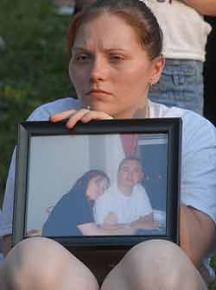Murdered for being an immigrant
explains the anti-immigrant atmosphere that led to Luis Ramírez being beaten to death.
THE MURDER of Luis Ramírez in Shenandoah, Pa., is the horrifying outcome of a climate of hate and scapegoating whipped up against undocumented immigrants. On July 29, demonstrators gathered in Vine Street Park on to denounce the racist murder of Ramírez, a Mexican immigrant, by a group of white teenagers.
In that same park on July 12, a group of high school students brutally beat and kicked Ramírez in the head while calling him racist slurs. According to witnesses, his attackers called him "stupid Mexican" and "fucking wetback" and told him to "go back to Mexico."
After being kicked in the head severely, Ramírez "started shaking and foaming out of the mouth," said Arielle García. Ramírez died two days latter in the hospital as a consequence of the head injury sustained in the beating.
Luis Ramírez was a 25-year-old Mexican immigrant who worked in a factory and picked strawberries. He moved to Shenandoah six years ago and, together with 24-year-old Crystal Dillman, was raising three children.

According to Dillman, a climate of racism existed in town and Ramírez had been called "dirty Mexican" before. "People in this town are very racist toward Hispanic people. They think right away if you're Mexican, you're illegal, and you're no good," she said.
Arielle García confirms this opinion. "I was pregnant with my son, and they told me, 'What's that in your belly? Another person I'm going to have to pay for? Another Mexican on welfare?'...stuff like that. It's disgusting," García told Democracy Now's Amy Goodman.
García and her husband Victor witnessed part of the fight and tried to help Ramírez when he was being beaten on the floor. One of the attackers told them, "Tell your Mexican friends to get out of town, or you'll be laying next to him."
Police investigators and town authorities initially tried to deny that racism was a factor in the fight. "From what we understand right now, it wasn't racially motivated," Police Chief Matthew Nestor told the Associated Press. "This looks like a street fight that went wrong." In the same fashion, Borough Manager Joseph Palubinsky, dismissed the testimony of witnesses and said, "I have reason to know the kids who were involved, the families who were involved, and I've never known them to harbor this type of feeling."
After outcry from the community, police have charged Brandon Piekarsky, 16, Colin Walsh, 17, and Derrick Donchak, 18, with homicide, aggravated assault and ethnic intimidation. Unfortunately, the minors are to be tried as adults, and their individual behavior and the fact that these minors were drinking is being used as an explanation for this dreadful event.
While Ramírez's death should not go unpunished, the fundamental reasons behind his death should be at the forefront of the discussion. Ramírez's attackers--like so many residents of the area--have been subjected to a hysterical campaign against immigration. The scapegoating of immigrants that has taken strength nationally in recent years was particularly significant in this economically depressed area.
While, at the national level, Congress debated the anti-immigrant Sensenbrenner Bill and President Bush ordered the construction of a new wall at the border with Mexico, in Hazleton, only 20 miles from Shenandoah, Mayor Lou Barletta made the issue of "illegal immigration" the center of his race for Congress.
Hazleton approved a law in 2006 prohibiting landlords from renting to undocumented immigrants, making English the official language and punishing employers for hiring undocumented workers. Parts of these laws have been overturned by the courts, but an appeal is in progress.
On the official Web site of the city of Hazleton, there's a link to a Web site called "Small Town Defenders" where Barletta argues:
Some come to this country and refuse to learn English, creating a language barrier for city employees. Others enter the country illegally and use government services by not paying taxes or by committing crime on our streets, further draining resources here in Hazleton...
Illegal aliens in our City create an economic burden that threatens our quality of life."
Barletta's xenophobic message barely stops short of a call to arms. In an interview with Fox's Neil Cavuto, he stated, "I believe the average American can now see how illegal immigration is affecting them, when a city like Hazleton--it's in northeastern Pennsylvania--has to stand up and defend itself... Action needs to be taken."
On the day of the protest, John Amaya, a lawyer of the Mexican American Legal Defense and Educational Fund (MALDEF), pointed out that, according to FBI data, violence against Hispanics has increased by 35 percent since 2003. "When we hear it spewed every night on CNN or radio talk shows, real people hear it and they take matters into their own hands," Amaya said, referring to the anti-immigrant sentiment behind the violence. "These children, they turn into monsters."
Amaya explained that protest organizers hoped to open the eye of the country, let people know what is happening and ensure that this type of crime does not go unpunished.
To end racism and xenophobia it's necessary to fight every instance of impunity in the criminal justice system. However, the life of Luis Ramírez was not simply ended by a group of individuals. No matter how appalling this crime was, it did not happen in a social vacuum.
Politicians and big corporations have promoted hate and used fear tactics to scapegoat immigrants, blaming them for the economic crisis. At the same time, politicians on both political parties continue to look for ways to further criminalize immigrants in order to better control and exploit undocumented workers. These powerful social forces have the ultimate responsibility in Luis Ramírez's senseless and tragic death.


